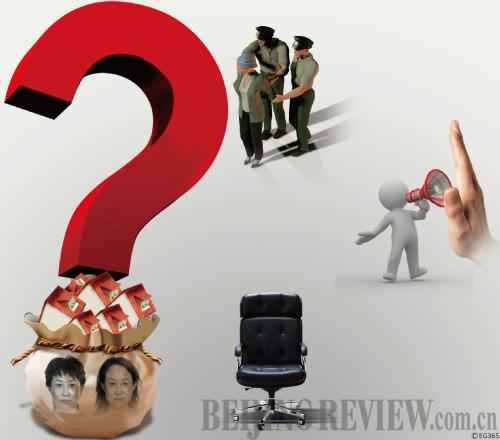|
 |
|
Gong Aiai (CFP) |
The case of a "house sister," a woman found to have illegally amassed more than 40 properties using multiple identities, sparked a round of public anger over administrative power abuses and oversight, as well as the nation's household registration system.
Gong Aiai, 48, former deputy head of the Shenmu County Rural Commercial Bank in northwest China's Shaanxi Province, was confirmed to have four hukou, a household registration record. Each Chinese citizen is entitled to one hukou. Two of Gong's "ghost" hukou falsely certified alternative residential status in Shanxi Province and the other fake ID was for Beijing.
To cool the property market, the government has installed controls restricting individuals from buying multiple homes, but forged identification can help property owners evade restrictions. Such cases have caused outrage in China as many people are still struggling to pay for even a single home.
Scandals
Early in January, online whistleblowers revealed that Gong had accumulated more than 20 properties worth an estimated 1 billion yuan ($159 million) in Beijing using fake identities. Official investigations later revealed additional properties in Beijing and Shaanxi.
Gong was detained on February 4 for forging official documents and government seals. By February 5, at least seven people, including four police officers, had been detained for helping forge hukou for Gong.
As a Chinese permanent residence registration and personal identification system, hukou is governed by police authorities.
According to a statement on Gong's case by the Ministry of Public Security on January 24, the ministry has launched a campaign to comb out fake and duplicate hukou identity records.
Police officers will be sacked if they are found responsible for illegal hukou registration and issuing identification, the statement said.
The ministry also encouraged public reporting of suspected violations, including online reports, and it promised careful handling of every tip-off.
Although hukou is an important personal certificate as it is linked with taxation and social welfare benefits such as education and medical care, Gong was far from alone in benefiting from multiple hukou.
Online posts exposed duplicate identities and 31 properties for Zhai Zhenfeng and three members of his family last December. Zhai, 49, is a former housing official in Zhengzhou, capital of central China's Henan Province. Zhai has been arrested for abuse of power. He was also found to have sold government-subsidized houses for personal gain.
Fake hukou use is not restricted to people purchasing extra properties. Corrupt officials themselves have also been found to have assumed identities to escape unwanted attention from watchdogs and the public.
Tao Yong, a former police head in Fengyang County, east China's Anhui Province, forged an ID card under the name Zhang Wei to open bank accounts in different cities to receive bribes. Tao was arrested last December for corruption and stood trial on January 16.
Chen Wenzhu, former head of the local bureau of tobacco monopoly in the southern city of Shanwei, Guangdong Province, forged IDs to bypass Party restrictions on overseas travel, including visits to Hong Kong and Macao. Chen was removed from his post and expelled from the Party on corruption charges in October 2011.
| 